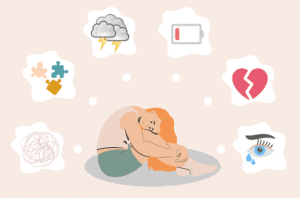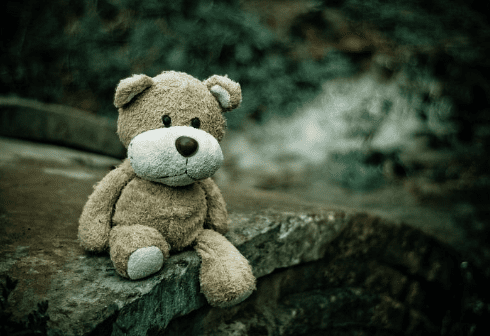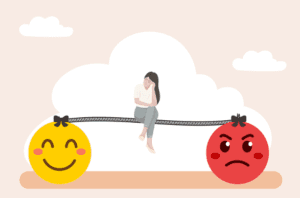UNHCR presents some sobering statistics on the numbers of people around the globe forced to leave their homes. By mid-2022 there were estimated to be 103 million refugees. That is approximately one and a half times the total population of the UK, and about one and a half percent of the world’s population. Of that unimaginably huge number, over a third – or 36.5 million – were under the age of eighteen. Strikingly it is calculated that a thousand children every day are born with refugee status.
The challenges facing these young people and their families are bewildering. Everyday facilities, resources, and community benefits which people in the UK take for granted, amount to little more than pipe dreams. Basic shelter, sanitation, education, health care, nutrition, and earning a living appear dauntingly out of reach, while language barriers and cultural differences in host nations may provoke and embed prejudice and hostility.
Anxiety is commonplace among refugee children
As my previous blog explained, for migrant children anxiety is a prevalent condition for which there is limited scope for formal treatment in many host countries. Nor, regrettably, is there much prospect of that situation immediately improving for the vast majority of the 103 million people presently forced into migration. Resources and services in host nations like Uganda (one and a half million refugees), Columbia (two and a half million refugees) and Turkey (over three and a half million refugees) are critically overstretched and underfunded, despite these nations’ best humanitarian initiatives. It is issues such as the impact of personal and political crises on people’s mental health which leads to conditions like anxiety and depression becoming long term and widespread.
A place for self-help strategies
While there is no substitute for professional advice and help, experts do recommend a series of self-help strategies which can prove beneficial in addressing symptoms of anxiety. Raising awareness about the importance and fragility of mental wellbeing is vitally important for everyone, especially for the most vulnerable people in global communities. Mental health first aiders are trained to promote these self-help strategies to empower people of all ages to attempt to regain some sense of control over their emotional wellbeing. By informing young refugees about practical steps endorsed by specialists they are likely to feel more positive in their outlook on their lives. That would amount to a significant start in appreciating and countering symptoms of anxiety, although there is no denying the uphill struggle which they will continue to face without professional treatment.
 What self-help strategies are accessible for young migrant people?
What self-help strategies are accessible for young migrant people?
Sports and exercise
Experts suggest that taking regular exercise is beneficial in addressing mental health conditions like anxiety. This could be as simple as going for a short walk. For a lot of young people, linking the issue with physical wellbeing is a natural place to begin. Regular exercise is acknowledged to be affirming for mental wellbeing. It improves fitness and can inspire a positive mood. This is a first step on the way to a broader and more positive outlook, which in turn can start to create a sense of self-esteem.
So if, for example, a group of migrant children were given a second-hand football, they would have the potential to improve their physical and mental wellbeing. Of course, unsupervised they might risk physical injuries, but potential benefits could reach comfortably beyond the children’s wellbeing into the heart of their community, if local people became involved in organising some basic training or informal games.
Thanks to organisations like Fairplay For All Foundation, operating in Payatas, young football players who grow up facing extreme poverty have been selected to participate in the Street Child World Cup, representing the Philippines. This is truly aspirational for others in the community. Imagine the liberating sense of fulfilment galvanised by this opportunity. For the majority of those invited to Doha to participate in this year’s global competition, it would have been their first time flying, just one beneficial aspect of such a broadening experience. Having ambitions like these is a powerful motivator and can certainly impact positively on mental wellbeing. By taking some daily exercise, however informally, young people may benefit from a host of other lifestyle improvements. For example, they are more likely to adopt better sleeping routines.
Building friendships
Moreover, social interaction certainly benefits mental health. This is especially vital as young children develop. Building friendships impacts positively on mental wellbeing, for instance by fostering self-confidence and a greater sense of self-esteem. Aberdeen-based charity, Befriend a Child reaches out to young people who face difficult personal circumstances. Volunteers regularly meet up with the children to help them increase their sense of self-worth, develop new skills, reduce isolation and promote positive wellbeing. Friendships can generate a feeling of belonging, together with a positive and purposeful outlook. This means that interaction with other young people can boost confidence and help to provide a broader perspective on other issues, whether through diversion or by changing a child’s dominant moods. Even something as simple as listening to jokes can help to improve outlook. Enjoying good friendships can also foster a common sense of purpose, which is potentially transformative for mental wellbeing.
Maintaining a balanced diet
It goes without saying that eating a well-balanced diet and keeping hydrated are also important to physical and mental wellbeing. It’s vital that information about these important aspects of everyday life are publicised, perhaps even by word of mouth, as a rudimentary element of any basic educational programme. Funding and resourcing a well-balanced diet for refugees is a huge economic and logistical challenge for host nations, but it is still fundamental to address awareness of these issues among young people.
The benefits of safeguarding mental wellbeing
There are of course other important self-help suggestions to safeguard and improve mental health. For example, mental health first aiders recommend deep breathing exercises, which can be performed almost anywhere and at any time. They can quickly bring a sense of calm to anyone feeling symptoms of depression, anxiety or stress. Young people are also encouraged to write an informal journal, if possible on a daily basis, briefly focussing on positive moments in their lives. These could be as simple as a good sleep, or fine weather. Mental health first aiders also commend mindfulness. While this may not immediately appeal to young people the benefits of calmly focussing on our surroundings and listening to our sensory responses are indisputable.
One important yet understated benefit of being part of a community is the potentially positive impact on children’s mental wellbeing. Bringing young people together, integrating them into informal activities offers a way ahead for migrants and refugees. The benefit of addressing mental wellbeing through self-help strategies may not appear to be as tangible as other fundamental improvements, but in a number of ways it is the most significant of all, helping to transform and empower some of the world’s poorest children.
Signposting help
Various organisations give advice on safeguarding mental wellbeing. For example, the NHS discusses the benefits of self-help tips for improving mental health. Moreover, in 2022 the Mental Health Foundation has produced a series of short, educational films to support refugee mental wellbeing. One tells the story of Mariam, who fled from Syria and now lives in Scotland. The video endorses the Mental Health Foundation’s support programme and promotes tips to improve and safeguard young refugees’ mental health. Hearteningly, in initiatives which the foundation runs in Wales and Scotland, asylum seekers and refugees are recruited and trained to serve as peer leaders. Their role is to foster empathy, understanding, and mental health literacy. By empowering people in this way, young refugees can derive an affirming sense of self-esteem, while appreciating the difference that can be made through constructive mediation.
In conclusion, young refugees can benefit a great deal from talking about mental health issues. Raising awareness and encouraging self-help through educational programmes, however informally, can make a marked difference to the mental wellbeing of young people, particularly when little or no expert medical treatment is available. Community initiatives, especially those which empower people from the refugee community, can prove to be advantageous in more ways than one. Naturally, young refugees benefit from improved knowledge of mental health, but they are also likely to look up to community role models. Anything which inspires young people, no matter what their circumstances across the world happen to be, can become transformational for them, providing them with a more purposeful outlook. This in turn will impact positively on their mental wellbeing.


